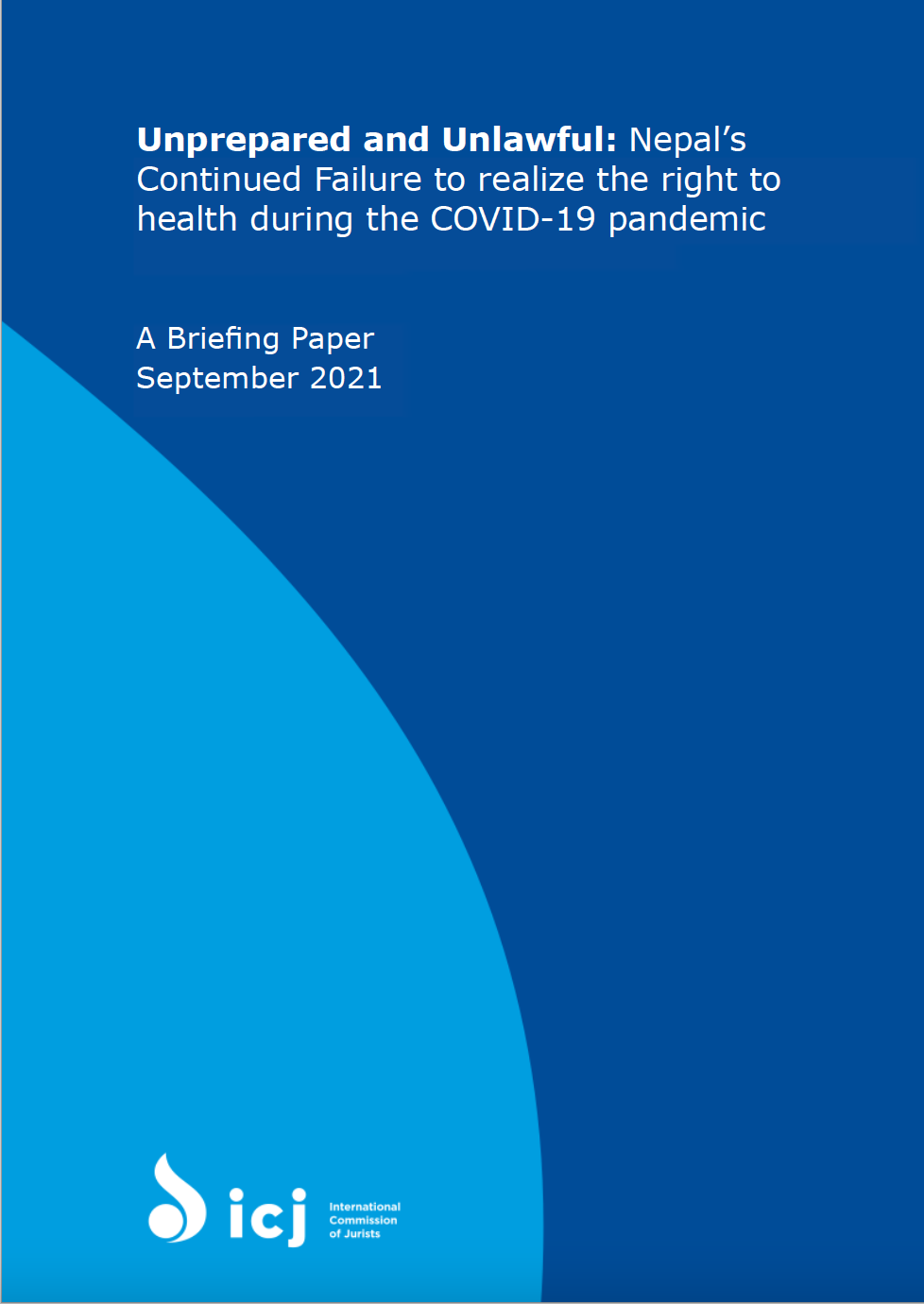Nepal’s authorities have largely failed to comply with their obligations under international law as well as the country’s constitution to guarantee the right to heath of all people facing the continued threat of the COVID-19 pandemic, said the ICJ in a briefing paper published today.
The 50-page briefing paper, ‘Unprepared and Unlawful,’ reveals a continuous pattern of deficiencies in public and private responses which were originally evidenced in the first wave of the pandemic in 2020 and have continuing to date. During the pandemic’s resurgence in 2021, the government failed to prepare for the predictable health crisis, leading to lack of oxygen, hospital beds, ICU capacity and medical equipment.
“Nepal, like other States, must respect, protect, and fulfil the right to health of all inhabitants to the fullest extent of its abilities, but our research shows that the Nepali government failed to prepare for the 2021 resurgence properly, despite clear direction from the country’s Supreme Court,” said Karuna Parajuli, ICJ legal advisor.
The report also addresses impact of significant delays and alleged impropriety in Nepal’s COVID-19 vaccine procurement and rollout processes.
“As it stands Nepal’s COVID-19 vaccination rollout plan has not been transparent or timely – the government is set to miss its own targets for vaccination. Problems with vaccination rollout deepen existing challenges that must be resolved by the Nepal authorities ranging from overcharging of private hospitals of COVID-19 patients, to inadequate provision of health services for non-COVID-19 patients, to attacks against health workers and overcrowded prisons,” Karuna Parajuli said.
In ‘Unprepared and Unlawful,’ the ICJ also provides a set of concrete recommendations to assist Nepali authorities comply with their legal obligation and prepare for further waves of COVID-19, including that they should:
- Ensure that the right to health is guaranteed to all people, in law and in practice, without discrimination;
- Ensure that there is uninterrupted supply of oxygen, hospital beds, ICU capacity and COVID-19 related medicines and equipment in all hospitals serving COVID-19 patients;
- Prevent overcrowding in prisons and ensure the implementation of all necessary COVID-19 health and safety measures;
- Ensure that all private healthcare providers, including hospitals and laboratories comply with legal requirements including those relating the cost of testing and treatment for COVID-19;
- Urgently develop and widely publish a COVID-19 vaccine acquisition and distribution plan, detailing concrete measures to ensure non-discriminatory access to COVID-19 vaccines to all inhabitants of Nepal as expeditiously as possible; and
- Proactively disclose and publicize contracts with pharmaceutical companies for the acquisition of COVID-19 vaccines to ensure transparency and accountability.
Contact
Timothy Fish Hodgson, ICJ Legal Adviser on Economic, Social and Cultural Rights, e: timothy.hodgson(a)icj.org
Mandira Sharma, ICJ Senior International Legal Adviser, e: Mandira.Sharma(a)icj.org
Karuna Parajuli, ICJ Legal Adviser- Nepal, e: karuna.parajuli(a)icj.org
Background
This Briefing Paper is an adapted & updated version of ICJ’s Redirecting the “Unconstitutional Path” of Nepal’s COVID-19 Responses published in November 2020 and is in line with ICJ’s September 2020 report Living Like People Who Die Slowly: The Need for Right to Health Compliant COVID-19 Responses, which highlighted health situation in different parts of world arising from the COVID-19 crisis and States’ obligations in protecting the right to health during the pandemic.
The ICJ examined and addressed the legal issues surrounding vaccine rollouts and the lack of transparency in government’s contracting with pharmaceutical companies in Maximum Disclosure: Secrecy in COVID-19 Vaccine Contracts and Other Shortcomings of Colombia’s Vaccine Rollout.
Download
Further Reading
Nepal: Seeking a rights-based approach to healthcare
New ICJ global report shows that the right to health must be central to State responses to COVID-19




